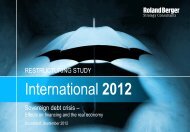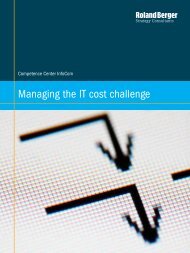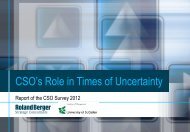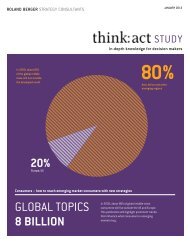issue 1 - Roland Berger
issue 1 - Roland Berger
issue 1 - Roland Berger
Create successful ePaper yourself
Turn your PDF publications into a flip-book with our unique Google optimized e-Paper software.
p business culture<br />
10 years after<br />
Completely underestimated<br />
Short Message Service (SMS) was developed 10 years ago and has become—almost by<br />
accident—a multi-billion-dollar business. Even though new SMS services are<br />
cropping up weekly for kids and teens, the medium still has unrealized potential.<br />
:<br />
Think back: Nelson Mandela became the<br />
first black president of South Africa;<br />
Israel’s Prime Minister Yitzhak Rabin and<br />
Palestinian leader Yasser Arafat signed an<br />
autonomy agreement in Cairo and received<br />
the Nobel Peace Prize for it; between<br />
Norway’s North Cape and Sicily, the European<br />
Economic Area was created; and in<br />
Uruguay agreement was reached on the<br />
creation of the World Trade Organization.<br />
In 1994 concepts like flexibility and mobility<br />
were leaving their mark on an already globalized<br />
economy. And it was not just highspeed<br />
trains like the British-French<br />
Eurostar—traveling through the newly<br />
opened Channel Tunnel—that were connecting<br />
people more quickly. For digital communications<br />
were also gearing up for a giant<br />
AT THE 1994 CEBIT, THE REAL<br />
SENSATION WAS ALMOST ENTIRELY OVERLOOKED<br />
BY EXPERTS AND VISITORS<br />
leap forward. In the United States the World<br />
Wide Web, with help from the revolutionary<br />
Netscape Navigator browser, was starting<br />
along its path to success, and in Germany<br />
ISDN was beginning to take off.<br />
Around the world, the telecommunications<br />
and entertainment industries were becoming<br />
interlinked. It was no longer a question<br />
of whether we wanted an information society,<br />
rather of what it should look like. While at<br />
Harvard, Cambridge and MIT the traditional<br />
field of computer science was starting to get<br />
to grips with the new discipline of “mobile<br />
communications,” Mannesmann Mobilfunk<br />
GmbH of Germany was establishing the<br />
world’s first professorship in it at the University<br />
of Dresden. And at CeBIT, the world’s<br />
largest computer trade fair, a few companies<br />
were already speaking of limitless mobility—<br />
and much more importantly, of the huge<br />
margins that would be available for<br />
businesses offering continuous connectivity.<br />
The reason for all the optimism was that, in<br />
1994, the cell phone was standing at the<br />
threshold of its worldwide breakthrough.<br />
Among all the hype, the real sensation of the<br />
1994 CeBIT went almost entirely unnoticed:<br />
the D1 Alpha Service by DeTeMobil. With<br />
pagers looking like the technology of the future,<br />
experts paid little attention to this first<br />
commercial precursor of the Short Message<br />
Service (SMS) technology of today. Even<br />
56<br />
think: act
















